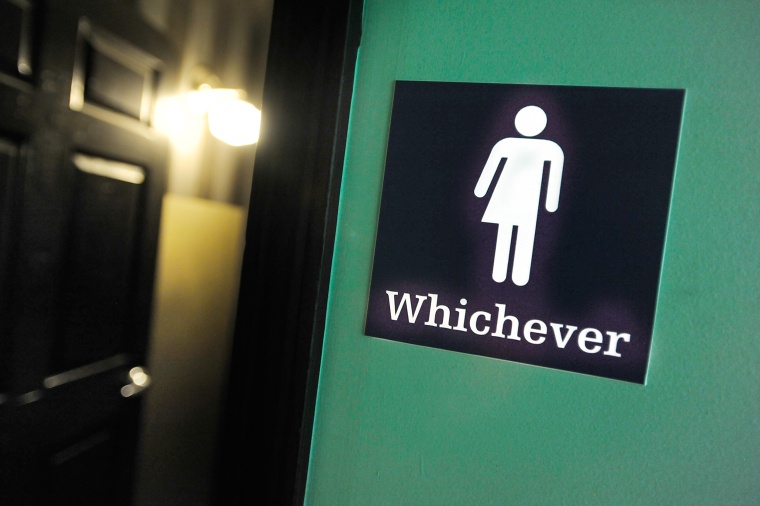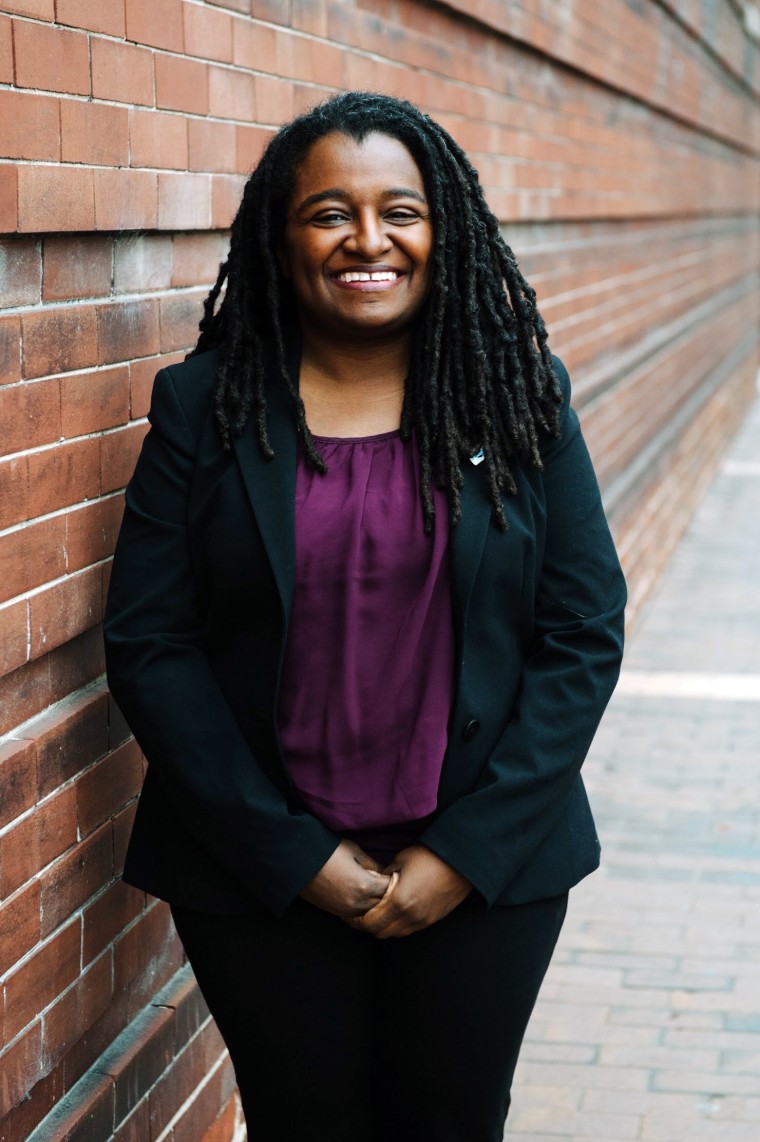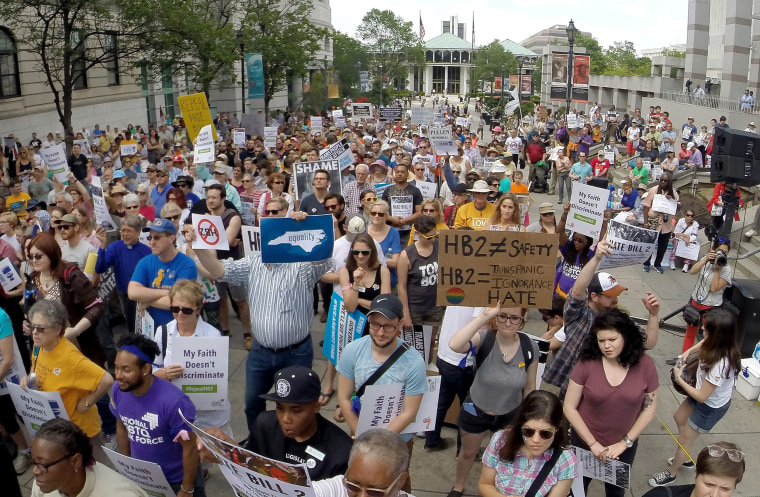North Carolina was thrust into the national spotlight in March 2016 over House Bill 2, which prevented transgender people in the state from using bathrooms that aligned with their gender identity.
The so-called bathroom bill sparked a nationwide backlash that wreaked havoc on the state, causing far-reaching political and economic damage. A controversial compromise bill was enacted a year later, but part of that legislation expired last week, leaving LGBTQ advocates and their opponents right back where they started four years ago.
HB 2's origin story
HB 2 was passed just weeks after Charlotte, the state’s largest city, enacted an LGBTQ anti-discrimination ordinance that explicitly allowed trans people to use public facilities that match their gender identity, as opposed to their sex assigned at birth.
That year alone, at least 16 states had considered laws limiting transgender access to sex-segregated facilities. But North Carolina was the only state to pass one. The General Assembly, which had Republican supermajorities in both chambers, had called special sessions to vote on the bill. (All 11 Democrats in the state Senate walked out in protest without voting.) Less than 12 hours after HB 2 was introduced, North Carolina Gov. Pat McCrory, a Republican, signed it into law.
But the Public Facilities Privacy & Security Act, as the legislation was formally known, wasn’t just a “bathroom bill”: It also barred cities, counties and municipalities from enacting any anti-discrimination policies not already covered by North Carolina state law.

A massive nationwide backlash ensued, with Adidas, PayPal, Deutsche Bank and other corporations scuttling plans for expansion in North Carolina, and TV and movie studios reconsidering shooting in the state. More than a dozen other states announced bans on travel to North Carolina.
Musicians Nick Jonas, Bruce Springsteen and Demi Lovato announced boycotts, while other performers, including Selena Gomez, Mumford and Sons, donated a portion of local ticket sales to LGBTQ organizations.
The sports world responded, as well: The NBA moved the 2017 All-Star Game from Charlotte to New Orleans, and the NCAA relocated March Madness basketball championship rounds outside the state.
The economic toll was staggering: A 2017 analysis by The Associated Press predicted North Carolina would lose more than $3.76 billion and nearly 3,000 jobs over the next dozen years as a direct result of HB 2.
Eight months after signing the bill, McCrory lost his re-election bid to then-attorney general Roy Cooper. Cooper, a Democrat, had come out strongly against HB 2 as the state’s chief lawyer, refusing to defend it against an American Civil Liberties Union lawsuit.
"We're talking about discrimination here," he said in a March 2016 press conference. "Not only is this new law a national embarrassment, it will set North Carolina's economy back."
A controversial compromise
Democrats and Republicans alike were eager to find a solution.
The result was House Bill 142 — passed in March 2017, almost exactly a year after HB 2.
The new law, however, stopped short of a full repeal of HB 2. It was denounced by many LGBTQ advocates, and even Cooper admitted at the time that it was “not a perfect deal” and “not my preferred solution.”
To appease LGBTQ advocates, it prohibited state agencies from regulating access to multiple-occupancy restrooms without the General Assembly’s consent. But in a move that outraged civil rights activists, it also barred local governments from passing any new anti-discrimination regulations for 3 1/2 years. That aspect of the legislation sunsetted Dec. 1. Now, LGBTQ groups are looking to resume the fight.

HB 142 was ostensibly supposed to press the reset button. In practice, however, “it was the same bill with new numbers,” according to Allison Scott, policy director at the Campaign for Southern Equality. The compromise hamstrings cities that want to affirmatively protect transgender people in multiple-occupancy, single-sex facilities. And HB 2 is still technically on the books, though a consent decree in the 2016 ACLU case prohibits its enforcement.
“It seemed like [HB 142] was going to release the pressure from the pushback North Carolina was receiving,” Scott said of the bill’s passage in 2017. “But on the ground, people in the community were like, ‘This isn’t going to fly.’ A lot of people outside North Carolina didn’t understand that.”
The Campaign for Southern Equality and Equality North Carolina are calling for the General Assembly to pass full and clean repeals of HB 142 and HB 2.
As a trans woman, Scott said both measures are very personal. “I call HB 2 and 142 ‘bills of trauma,’” she told NBC News. “They were very specifically targeting a group without naming us. It meant more than ambivalence; it was outright hate.”
When HB 2 passed, Scott was working in a Fortune 500 company in the state. Despite a stellar performance record, she said she was harassed because of her gender identity. When the compromise bill was signed, “They just resumed business as usual,” she said. “I think they felt emboldened.”
Scott said the bathroom issue was a red herring conjured up by conservatives to create panic among an uninformed constituency.
“When [my co-workers] went to HR to ask to have me fired, they didn’t bring up bathrooms,” she said. “When I got death threats, bathrooms weren’t mentioned.”
Scott said she has actually seen an escalation of hateful behavior since the passage of HB 142.
“In some ways people in the community wish it hadn’t been in the public eye, because at least then there wasn’t awareness,” before the fight over bathroom bills, she said. “Now people yell at you for walking in a public space. They threaten you for trying to go to the bathroom. It’s gotten much worse.”
“I have to give GOP leaders credit,” she added. “The compromise didn’t deal with the stigma but continued the hateful part right underneath the public’s eye.”
Different year, same fight
The long battle has underscored the North Carolina General Assembly’s control over local governance, according to Jillian Johnson, mayor pro tempore of Durham.“North Carolina cities and counties have to have the authority to pass legislation,” Johnson, who identifies as queer, said. “We spend a lot of time trying to figure out what is and isn’t allowed by the General Assembly, when we should be spending time helping our communities.”
President-elect Joe Biden has promised to push for passage of the Equality Act in his first 100 days. The federal measure would protect LGBTQ people from discrimination in housing, employment and public accommodations — including bathrooms. It’s by no means a sure thing, though: The bill passed in the House last year but has languished in the Senate. Even if the Equality Act does pass, Johnson still wants to see a more local solution.

“A state law would still be great to cover nuances that maybe federal law doesn’t,” she said. “And city laws, too, to address specific issues within the local LGBTQ community.”
No cities in the Tar Heel State have drafted an LGBTQ anti-discrimination bill since HB 142’s ban expired, the North Carolina Metropolitan Mayors Coalition told the Fayetteville Observer, but advocates were galvanized at a virtual town hall meeting Tuesday.
“We are still in the process of figuring that out,” Johnson said of efforts in Durham. “There’s an attitude of excitement and possibility. We’re talking to lawyers, talking to other cities, figuring out how to move forward. We’re lucky in that Durham is pretty unanimously in favor of an anti-discrimination ordinance.” Scott favors a federal law protecting transgender and gender-nonconforming Americans. Barring that, she endorses a statewide measure over cities ordinances. “I’m never a fan of patchwork policy,” she said. “It doesn’t speak to the spirit of equality.”
According to a 2019 Public Religion Research Institute poll, 67 percent of North Carolinians support laws protecting LGBTQ people in employment, housing and public accommodations.
But in an election year, with North Carolina facing the coronavirus pandemic and resultant economic hardship, priorities have been focused elsewhere.
“It’s been such a tumultuous year,” Scott said. “And a GOP majority is still in place. We broke the supermajority, and Gov. Cooper can any veto HB 2-style bill, but it’s still really hard to get anti-discrimination bills on the floor. The GOP hasn’t shown a lot of willingness to work with us and do the right thing.”
Proponents of HB 142 are also marshaling their forces: In a November opinion piece in the North State Journal, Tami Fitzgerald, leader of the North Carolina Family Values Coalition, accused LGBTQ groups of trying to “reboot the divisive and tired debate on HB2” when the state was at its most vulnerable.
The conservative Christian organization opposes any new ordinances and is urging the General Assembly to make HB 142’s ban on local anti-discrimination laws permanent when it convenes in January.
According to Fitzgerald, such laws are “a Trojan horse to weaponize hate and hostility toward small-business owners and private citizens with sincerely held religious beliefs.”
These laws, she wrote, “coerce uniformity of thought and speech on beliefs about marriage, sex and what it means to be male and female” and “take away free speech and religious freedom for a vast number of Americans.”
The national support for North Carolina’s LGBTQ community that was so crucial when HB 2 passed in 2016 hasn’t materialized this time around, according to activists, even though queer people in the state find themselves in much the same position.
Scott said if she were to book a room in a hotel, there’s nothing stopping the receptionist from barring her from the sex-segregated lobby bathroom. The Campaign for Southern Equality, she added, is routinely contacted by people who have been discriminated against — often trans and nonbinary individuals, and especially people of color.
“Just because it’s not being covered by the media doesn’t mean it’s not happening,” she said. “We’re a right-to-work state, and the fear of being fired is so strong, especially if you complain about being discriminated against.”
On a personal level, Johnson said the most challenging aspect has been acknowledging that the support in 2016 wasn’t really about LGBTQ rights but about business and entertainment.
“The conversation wasn’t, ‘How can we protect queer and trans people?’ It was, ‘How can we bring back basketball?’” she said.
“The vast majority of people exerting pressure on the Assembly were not concerned about me and the people in my community, they were concerned about losing money.”
It’s disheartening, she confessed.
“I’m used to taking my allies where I can. I appreciate that it shows the power of boycott as a political tool. But it’s different from a moral imperative.”


